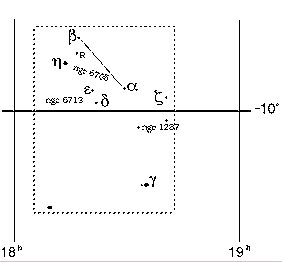Scutum

![[de]](../../Logos/flag_ger.gif)
![[it]](../../Logos/flag_it.gif)

Particulars:
General:
The constellation of Scutum is being counted to the Hercules
constellation family. Although it
is one of the smallest constellations (in fact the 5th smallest), it is
located in a very interesting part of the sky because next to the Milky Way it
contains rich Milky Way star fields and therefore is also for the amateur
astronomer of interest.
Scutum can be found southwest from
Ophiuchus and southeast
from Aquila, the Eagle, just
ten degrees south of the celestial equator.
Stars and other objects
Delta Sct is the prototype of a rare class of variable stars undergoing
small pulsations within the range of a few hours; this leads to minor changes
in the brightness of the star. The variation have a period of 4h 40min during
which the brightness varies from 4.6 mag to 4.7 mag.
R Sct is a yellow giant variable star of the RV Tauri type. It varies
permanently (and semi-regularly) between 5th and 8th mag.
The "Wild Duck Cluster" M 11 (NGC 6705)
is magnificent in large telescopes.
The faint open cluster M 26 is nice and
tight cluster. Detailed information about this cluster and
M11 can be found in the Messier
database.
The diffuse galactic nebula I 1287, lying about two degrees south of
alpha Sct, requires at least an avarage telecopic power.
The meteor shower June Scutids
is active from June, 2nd, to July, 29th. The maximum occurs on June 27th; the
hourly rate is 2 to 4 meteors. See Gary Kronks database about
meteor showers for detailed information.
Mythological Background:
????
![[Constellations]](../../Logos/constS_s.gif)
![[Home]](../../Logos/maa_s.gif)